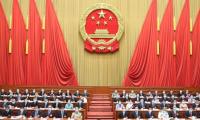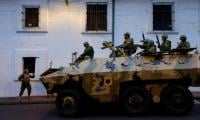Ebola rises
The Ebola epidemic in West Africa from 2013 to 2016 left more than 11,000 dead and panicked the American public when a few isolated cases turned up on U.S. soil. By the time the outbreak was contained, the international community had learned valuable lessons about how to combat the virus.
Now, a new outbreak in the Democratic Republic of the Congo (DRC) is testing that knowledge – and the political will of the global community to mount a robust response.
With more than 830 deaths since August 2018, the epidemic in northeastern DRC is the second-largest recorded, behind the multi-country epidemic in West Africa. The DRC outbreak has not yet crossed international borders. Moreover, responders are applying new solutions, including a vaccine that has proved effective.
But many health experts argue that the threat is underestimated, leading to a dangerously inadequate global response.
As of late March, the World Health Organization (WHO) had received less than half of its $148 million funding request for Ebola over the next six months. The WHO bureaucracy, moreover, appears hesitant. On April 12, the agency again declined to declare the epidemic a “public health emergency of international concern” – a designation that could unlock critical resources needed to bring the outbreak under control.
One reason for the tepid response may be the remote location. The DRC epidemic is centered more than 1,000 miles from the capital, Kinshasa. In West Africa, by contrast, three coastal countries were affected, including capital cities with direct air links to Europe and North America.
Nonetheless, the threat of spread beyond the DRC worries health experts. Tens of thousands of people a day cross the borders from the area into Rwanda, Uganda, and South Sudan. Indeed, WHO’s statement expressed “deep concern” about the “potential risk of spread to neighboring countries.”
The response to the epidemic does show that important lessons have been learned from West Africa and from other previous outbreaks. The DRC Health Ministry has gained experience from nine outbreaks in that country since 1976, all of which were contained relatively quickly.
There is also new leadership at WHO: Dr Tedros Ghebreyesus, the agency’s first African director, took office in 2017. Researchers, notably at the US CDC, have honed containment procedures and developed a new vaccine that is being used in the DRC. The CDC has worked with other international agencies and with national health ministries in training and preparing for a rapid response.
At a March 14 hearing of the Senate Appropriations Subcommittee, CDC director Dr. Robert Redfield laid out the measures being taken. Essential steps to contain further spread include tracing the personal contacts of Ebola cases and checking the health of border crossers. Multiple actors are collaborating. Nonetheless, the outbreak has not yet been contained.
One obstacle, which also existed in West Africa, is lack of trust by local people whose cooperation is essential for timely identification of victims and their contacts. Medical procedures required to treat those infected with Ebola, and for handling the dead, frighten and alienate many people.
Excerpted from: ‘The Coming Ebola Epidemic’. Courtesy: Counterpunch.org
-
 China’s Two Sessions 2026: Key Decisions, Economic Targets And Policy Shifts To Watch
China’s Two Sessions 2026: Key Decisions, Economic Targets And Policy Shifts To Watch -
 Flames’ New Arena In Calgary Earns Praise From NHL Commissioner After Construction Visit
Flames’ New Arena In Calgary Earns Praise From NHL Commissioner After Construction Visit -
 New Email Connects Jeffrey Epstein To Beatrice And Eugenie Because Of Sarah Ferguson: ‘They Should Own This Publicly’
New Email Connects Jeffrey Epstein To Beatrice And Eugenie Because Of Sarah Ferguson: ‘They Should Own This Publicly’ -
 Are You Quitting ChatGPT? Here’s What To Do Before You Switch
Are You Quitting ChatGPT? Here’s What To Do Before You Switch -
 Wild Acquire Michael McCarron From Predators In Trade For 2028 Second Round Pick
Wild Acquire Michael McCarron From Predators In Trade For 2028 Second Round Pick -
 Christopher Reid Gives Update On His ‘heart Failure’
Christopher Reid Gives Update On His ‘heart Failure’ -
 Cole Smith Joins Golden Knights In Deal With Nashville Predators
Cole Smith Joins Golden Knights In Deal With Nashville Predators -
 Arber Xhekaj Rumours Surface As Flames Explore Trade Options With Canadiens
Arber Xhekaj Rumours Surface As Flames Explore Trade Options With Canadiens -
 Sarah Ferguson’s Utter Devastation Comes Forward: ‘Her Safety Nets Are Gone’
Sarah Ferguson’s Utter Devastation Comes Forward: ‘Her Safety Nets Are Gone’ -
 Ecuador Drug War Intensifies As US And Local Forces Launch Operations
Ecuador Drug War Intensifies As US And Local Forces Launch Operations -
 South Korea Markets Sink As Kospi Records Worst Day In Decades Amid Iran Conflict
South Korea Markets Sink As Kospi Records Worst Day In Decades Amid Iran Conflict -
 Social Media Ban: Virginia Appeals Injunction Against Social Media Screen Time Limit For Children
Social Media Ban: Virginia Appeals Injunction Against Social Media Screen Time Limit For Children -
 Roy Cooper Projected Winner In North Carolina Democratic Senate Race
Roy Cooper Projected Winner In North Carolina Democratic Senate Race -
 Steve Toth Claims Lead Against Dan Crenshaw In Texas Congressional Race
Steve Toth Claims Lead Against Dan Crenshaw In Texas Congressional Race -
 Alibaba’s Qwen AI Division Head Resigns Shortly After New Product Launch
Alibaba’s Qwen AI Division Head Resigns Shortly After New Product Launch -
 Jasmine Crockett Nearly Tied With James Talarico In Texas Senate Primary
Jasmine Crockett Nearly Tied With James Talarico In Texas Senate Primary



